BOP's 50 Most Romantic Movies: 40-31
February 9, 2006
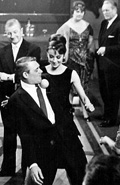 40) Charade
40) Charade
Cary Grant turns up in a number of our Top 50 romances, and there's a very good reason why. Besides his good looks and debonair, charming manner, that is. Grant's romantic film choices tended more towards that unique sub-genre known as the romantic thriller. He also had the good fortune of working in movies during the time when a romantic comedy didn't mean sit-com-friendly and likely to give diabetics insulin shock, but instead offered more adult situations and reactions than one tends to find these days.
Charade falls into the former category, a romantic thriller that costarred Grant and the lovely Audrey Hepburn. The love story in this film is unique on several levels. The main thrust of the romantic subplot dwells on the idea that one person can never truly know another, and that this lack of knowledge can lead to danger as well as a broken heart. Directed by Stanley Donen, Charade has been called the best Hitchcock film that Hitch never made, and given the convoluted plot and the adult nature of the romance, it's easy to see why. The script is smart and witty, and the puzzle at its center is excellently plotted, keeping one step ahead of the viewer whilst playing fair with all the clues. The film is also unique in the way the romance between the characters played by Hepburn and Grant begins and builds. Grant was more than 20 years Hepburn's senior when the film was made, and he felt it would be rather unseemly for a man who was literally old enough to be Hepburn's father to pursue her character, so before he would commit to the film, he requested that the script be changed so that it was Hepburn's character who chased his, and not the other way around, as it was originally written. That's a bit of class that some of today's older male stars could take a lesson from (yeah, Woody Allen; we mean you).
Charade is a wonderful mix of intrigue and suspense liberally laced with a romance that is charming instead of cloying, a welcome break from the syrupy love stories that are so common today. (Stephanie Star Smith/BOP)
|
|
|
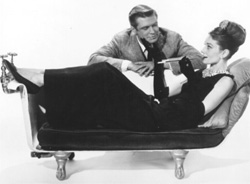 39) Breakfast at Tiffany's
39) Breakfast at Tiffany's
How romantic is this movie? It's been immortalized in song by one-hit wonder Deep Blue Something. The single is a statement about the sole commonality an otherwise woefully mismatched couple has in their relationship. Hey, we've all been there and when the sex has been good, we haven't broken it off as fast as we probably should have. But I digress.
The everlasting appeal of Breakfast at Tiffany's as a romantic accomplishment is the character of Holly Golightly. She's a New York socialite with huge dreams and impossible ambitions, spending the body of her days sleeping off the previous night's party. Then, she gets dolled up as the afternoon wanes in anticipation of another night of frivolity. The repetition of her life's activities is largely lost on her, as is the defining nature of her acceptance of money and gifts from the men who keep her acclimated to the Tiffany's diamonds lifestyle. Golightly's goal is to eventually marry one of these rich men/sugar daddies who are drawn to her, thereby permanently securing herself the good life. But the doubt has already begun to set in about the practicality and potential pitfalls of this desire. The love of old, rich men is often cold.
Our heroine's life is turned on its head when she meets a kept man and struggling writer who lives upstairs. Paul is immediately entranced by the vivacious, energetic young woman who sees a side of the big city that he never notices from the solitary confines of his apartment. The two prove to be a perfect compliment of internal and external with Holly enlightening Paul on the joys of night life and him helping her work past her misgivings about her shaky life choices. Ostensibly, it's a relationship between friends rather than lovers, but both begin to suspect that no matter how much they fight it, they are falling for one another. It's a predictable plot to be sure, but both main characters still ring as true today as they did in 1962. Coming to terms with one's own insignificance in a metropolitan area with millions of inhabitants is intimidating to even the Holly Golightlys of the world.
Truman Capote's creation of Holly Golightly is arguably his greatest accomplishment as a writer, and the astounding work from the page is somehow improved by the performance of Audrey Hepburn. The actress attacks the somewhat dark character of prose and re-invents her as a much more optimistic romantic lead. Part of this is because the bleakness of her life as a call girl is eliminated from the novella, turning Golightly into a (somewhat) more reputable romantic lead. The larger reason, though, is that Hepburn proves throughout her career that she is capable of making sparks fly with any actor. Never is this more demonstrable than in the arms of George Peppard (yes, the A-Team guy). The scene where they spend a rainy morning searching for a cat is one of the most romantic moments in cinema history. It should be required Valentine's Day viewing for any struggling couple coming to terms with the unexpected aspects of love. (David Mumpower/BOP)
|
|
|
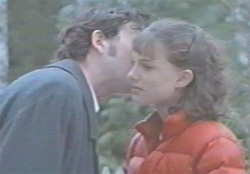 38) Beautiful Girls
38) Beautiful Girls
A preternaturally mature 15-year-old girl shows a struggling grown man the path to enlightenment. Bizarre as it sounds, the relationship between this duo as portrayed by Natalie Portman and Timothy Hutton is one of the most intense in modern cinema. In point of fact, the beauty of the film is in the character of Marty. She is the personification of what men fear they will leave behind from their boyhood if they take that final, permanent step into commitment.
The constantly befuddled Hutton character, Willie Conway, knows he is in murky territory when he ever he talks/flirts with this impossibly wise neighbor girl. Despite this, he keeps engaging her in discourse because she appears to have a better grasp on his situation that he does. For her part, she is struggling with the difficulties faced by people of her talents. She is caught between a world of peers who largely bore her and one that isn't ready for her growing confidence.
And that's just one relationship in the interpersonal dynamics-intensive Ted Demme comedy drama. There is also Willie's relationship with Tracy (Annabeth Gish). She is ready for him to grow up and leave behind the sewn oats phase of his life. To Willy and the other men in Beautiful Girls, though, such a move is akin to actively walking away from happiness. It explains why Paul (Michael Rappaport) humiliates himself so completing in proposing to Jan (Martha Plimpton). It exemplifies why Tommy keeps chasing after a high school sweetheart who has since married another man. Beautiful Girls is all about the exploration of romanticism as it equates to masculinity and boyish dreams left behind as we get older. (David Mumpower/BOP)
|
|
|
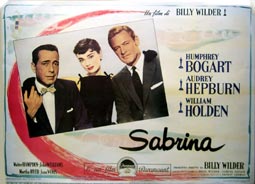 37) Sabrina (1954)
37) Sabrina (1954)
Despite being remembered for a number of romantic films, Humphrey Bogart is far from the typical male lead in the genre. In the African Queen, he's a dirty, low-class boatman, and in his films with real-life wife Lauren Bacall, he's nothing short of abrasive. He's plays a little closer to convention in this marvelous Billy Wilder comedy, though it's William Holden who gets the most flamboyant of the male roles in the film.
The story is classic romantic comedy fodder. Sabrina (the always lovely Audrey Hepburn) is the daughter of a chauffeur for a wealthy family, the Larrabees. She's a big, big dreamer, and hopes to one day rise above her current station in life; she has just returned from an extended stay in Paris and is far wordlier than she once was. One of the Larrabee boys, David (Holden), falls hard for Sabrina, though it's difficult to conceive that he could possibly have permanent designs on her. He's an irrepressible playboy, and despite his flashy great looks, you know that he's destined to break her heart. The other problem, of course, is that David is already engaged to be married to the daughter of another wealthy family.
Enter Linus Larrabee (Bogart). Worried that his brother's flavor-of-the-day obsession with Sabrina will damage the upcoming nuptials, Linus interferes by charming her himself. As he does so, Linus and Sabrina actually find that they are wonderfully matched, and after a series of misunderstandings, happy endings are in the works for all. A wonderfully charming scene with an umbrella punctuates the movie's finale. It's a marvelously acted, entirely engaging love story that features some of the greatest performers Hollywood has ever offered. (Kim Hollis/BOP)
|
|
|
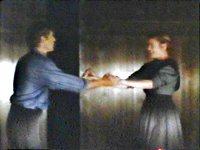 36) Witness
36) Witness
Witness is the best movie that Harrison Ford has ever been in. There, I said it. Director Peter Weir's multi-layered story is, at times, a police drama, a meditation and study in Amish life, a thriller, and a romance. And it is great at each of them.
Who would seriously believe that tough guy detective John Book (Ford, in an Oscar-nominated performance) and simple, conservative, Amish widow Rachel Lapp (Kelly McGillis, before she disappeared off the face of the Earth) would ever have anything to do with one another? He is a single, slovenly, rough-edged, no-nonsense type. She is a respectful, religious, clean, patient, motherly type. He lives in the big city, beating up and catching bad guys. She lives on a farm in the middle of nowhere, and doesn't even have a phone. Oh yeah, and she has a young kid.
And while waiting in a Philadelphia train station, that kid witnesses the murder of a police detective (in a chilling scene). One thing leads to another and Book ends up going back to Amish country with them in order to protect them. Gradually he and Rachel begin to show feelings for one another. Weir makes this star-crossed romance work because everything else in the movie works. By the time the pair dances along in a garage to Sam Cooke's "Wonderful World," you never would have doubted it for a moment. (Michael Bentley/BOP)
How Well Do You Know: Witness
|
|
|
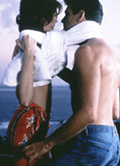 35) The Thomas Crown Affair (1999)
35) The Thomas Crown Affair (1999)
More than any other Bond to date, Pierce Brosnan has been the most successful in carving out a career separate from his high-profile role as the British super-spy. This is partly because Hollywood is a different place now than it was 40-some-odd years ago, when 007 first appeared on the silver screen, but it is also attributable to Brosnan having his own production company, Irish Dreamtime, and using his cachet as Bond to get projects greenlighted that very well might not otherwise see the light of day. Brosnan has also made a concerted effort to seek out roles that are a departure from the debonair secret agent, building a resume sufficiently diverse as to avoid the typecasting that might otherwise have been insurmountable, given both his portrayal of 007 and his own public persona.
But when Irish Dreamtime was just getting off the ground, Brosnan chose to go for a sure-bet fit, the better to provide a solid foundation for his new company. And thus was born this remake of the 1968 Steve McQueen vehicle, and the role of the eponymous billionaire who could easily be James Bond's twin brother. Thomas Crown, however, would be the black sheep of the family, employing his nimble mind, nerves of steel and unflappable demeanor in stealing art masterpieces from museums rather than in Her Majesty's Secret Service. Inhabiting a role nearly as tailor-made for his screen persona as the suave super-spy afforded Brosnan the opportunity to slip into the part as comfortably as one might wear a favorite pair of old sneakers, and play it with great relish. He meets his on-screen match in Rene Russo's Catherine Banning, the insurance investigator assigned to find the prize in Crown's latest heist, a priceless Monet. The delicious cat-and-mouse game that follows becomes not only a test of wills and intellect, but also the mating dance of two lonely people who have what psychologists would refer to as "trust issues". That Banning and Crown have a mutual attraction that might become something deeper is never in doubt; whether each can let down the barriers that have been erected to keep the heart safe is.
The film benefits greatly from the chemistry between its two stars, and the strong supporting cast. It's also a plus that the romance is woven into the intricate suspense plot, where the query posed to the audience isn't who-done-it, but will he be caught? And its corollary, of course: Will these two people nurture their tenuous connection, or will one of the lovers betray the other? The conclusion isn't entirely a foregone one, and the questions aren't settled until the final moments, and the outcome is both satisfying and well-earned. (Stephanie Star Smith/BOP)
|
|
|
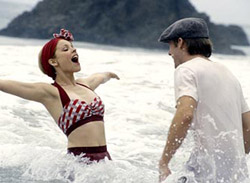 34) The Notebook
34) The Notebook
Now, I'm not a real mushy kinda guy. I like guns, aliens, blood and nudity in my films. You can imagine my surprise when I felt tears running down my cheeks during The Notebook. Nick Cassavetes' 2004 adaptation of Nicholas Sparks' best-selling novel is quite possibly the perfect love story. Gena Rowlands, obviously suffering from the middle stages of Alzheimer's, is living in a nursing home. One day, the nurse brings in an old gentleman to read to her, to maybe help her cope with life in a home. James Garner does the reading and he tells her a wonderful tale of young love. Allie Hamilton and Noah Calhoun meet at a carnival when they were young adults and quickly fall in love. Broken apart by Allie's disapproving wealthy parents, Allie finds love again and gets engaged to be married. While reading the paper one day, she comes across an article on Noah and the 200 year old house he had promised to renovate for her, in a moment of dreamy eyed youth. Intrigued by his work, she pays him a visit only to find that some feelings never die. We then learn that Gena Rowlands is Allie and Garner is reading to her from a notebook telling their love story. At the end of the story, she "comes back" for just a few minutes. And it's here that we learn that every single day, he reads that story to a woman who has no idea who he is in hopes of spending mere seconds with the girl he feel in love with. Honestly, I don't know if a more pure and true love story has even been told. (Jim Van Nest/BOP)
|
|
|
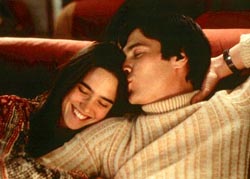 33) Waking the Dead
33) Waking the Dead
I don't want to cause you any pain. I just want to love you. These are the haunting lyrics that punctuate Billy Crudup's journey through Waking the Dead, an admittedly darkly titled film for this particular list. For that matter, the movie itself is oftentimes bleak. The permeating theme is of true love lost along with the accompanying sensations of isolation and abandonment.
Crudup portrays Fielding Pierce, a rising politician coping with unresolved feelings for his dead lover, Sarah Williams. As portrayed by Jennifer Connelly, Williams is the yin to Pierce's yang. Whereas his career consists of suppressing idealism in order to work within a bureaucracy, she lives life in more heroic fashion. An activist of passion and zeal, Sarah takes time out from her busy schedule of trying to save the world in order to seduce Pierce.
Some time after the fiery embers of their love have dwindled, Sarah's politicking gets her in trouble. A car bombing victim, she is presumed dead. Fiedling's heart and a bit of his mind leave him at that moment. Neither are ever completely recovered. The film is an exploration of this state with a final sequence summarizing Fielding's state of mind. Sarah arrives at his residence, claiming to never have been in the car which had been bombed. The two fall into each other's arms and re-kindle their passion, but an ambiguity exists. Even Fielding himself expresses later confusion about whether the night happened, allowing for the possibility that the dark recesses of his mind rejected her death so much that he had to invent a new explanation.
Waking the Dead is a somber reflection upon what it means to find the perfect companion only to have them pulled from your grasp in tragic fashion. Depressing though it may be, such heartbreak is an aspect of romance just as much as the first kiss is. (David Mumpower/BOP)
|
|
|
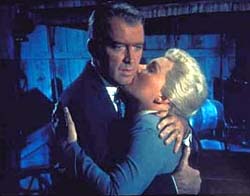 32) Vertigo
32) Vertigo
Love is obsession. It is a compulsion, a fixation that bubbles beneath the surface, mirroring the happy side of the promised emotional fulfillment. No director has ever explored this subversive undercurrent of romance as effectively as Alfred Hitchcock in Vertigo.
The James Stewart/Kim Novak movie is a stunning exploration of human emotions. Stewart portrays an acrophobic failed cop who is hired to stalk...err, closely follow a wife with emotional problems. Over the course of his constant binocular dates with the subject, Stewart's character, Scottie, romanticizes the woman, Madeleine into his ideal mate. Hopelessly smitten, he follows her everywhere but is emotionally destroyed when unable to save her from a suicide. Later on, Scottie accidentally encounters Judy, a doppelganger for his lost love. The two embark on a relationship, but his obsession with a dead woman forces him to try to alter her appearance and even her actions to further mimic the deceased. Meanwhile, she harbors a secret so devastating she fears his discovery will lead to irreparable separation. Over time, they both make sacrifices and enact lies in order to stay together.
Admittedly, this does not sound very romantic at first blush. As with all major Hitchcock works, though, the description does not do justice to the subject matter. Stewart's fear of falling could easily be extended into a metaphor for falling in love. Madeleine as an impossibly perfect woman placed on a pedestal he can never climb is the association through which the audience is shown his central weakness as a person. When an eerily similar woman falls right into his lap, Scottie struggles to accept his fortune. He is so damaged that he drives even his dream woman away. Conversely, Judy is so amorous of Scottie that she is willing to accept his selfish mistreatment as long as it allows her to remain close to him. Her insecurity and fear of him getting to know her true identity is the same emotion all of us feel at the start of a new relationship. Once our mysteries are revealed, the nakedness is enjoined with a fear of rejection. Vertigo is a brilliant implementation of the early stages of love in movie thriller form.
|
|
|
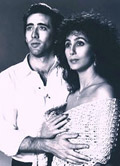 31) Moonstruck
31) Moonstruck
A few decades ago - before the infomercials and the endless farewell tours - Cher was a pretty decent movie star. In the late '80s, she turned in a number of solid acting roles. Foremost among these was Moonstruck.
Norman Jewison's 1987 film was a story not of one romance, but of many. The film is populated with characters experiencing different phases of love - falling in love, believing that love has abandoned them, only to find it again. The central relationship in the film concerned Cher's Loretta. Loretta is a widow, resigned to marry Johnny Cammareri (Danny Aielo). Johnny is a decent man, but his relationship with Loretta is one of comfort, without passion whatsoever. When Johnny unexpectedly must suddenly leave the country to see to a sick relative, Loretta meets Johnny's brother Ronny. Ronny, played by Nicolas Cage, falls hard for Loretta. She, in turn, enters into a tug-of-war with herself, trying to reconcile her heart and her mind. She largely believes that a chance at love has passed her by, yet she is inexplicably drawn to this man. She attempts to resist, knowing that such a relationship is impractical and does not make sense considering her situation and the relationship between Johnny and Ronny.
In time, though, Loretta's resistance breaks down in the face of Ronny's sincerity, as her heart wins out over your mind. You cannot choose who your heart loves, the film reminds us. The romantic part of humanity will lead us where it will. Love makes us do things that to the rational side of us are crazy. Yet, it is the best kind of crazy. (Tony Kollath/BOP)
|
|
|
|
|
|
|

